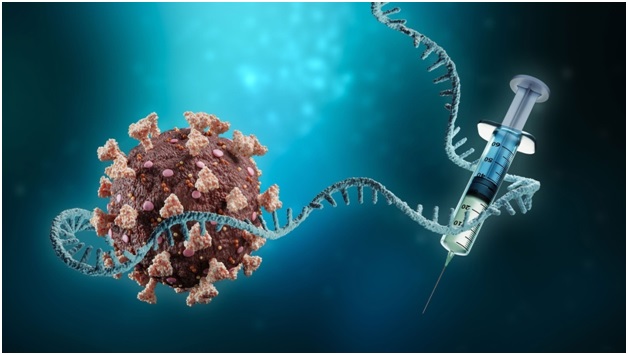Controversies Arising from a Potential Nobel Prize for mRNA COVID Vaccines (The Hindu)

- 05 Oct 2023
Why is it in the News?
The 2023 Nobel Prize for Physiology or Medicine has been granted to Katalin Karikó and Drew Weissman in recognition of their contribution to the development of mRNA vaccine technology. While the Nobel Prizes are intended to honor achievements that have benefited humanity, a strict assessment of scientific accomplishments raises questions about whether the subset of mRNA vaccines used during the COVID-19 pandemic fully aligns with these standards.
What is an mRNA Vaccine?
- Messenger RNA (mRNA) is a type of single-stranded RNA crucial for protein synthesis.
- It is synthesized from a DNA template during the transcription process.
- mRNA vaccines function by introducing a specific mRNA fragment that corresponds to a viral protein, often a segment of a protein located on the virus's outer surface.
- When this mRNA enters cells, it instructs them to produce the viral protein.
- As part of the body's natural immune response, the immune system recognizes this foreign protein and generates specialized proteins known as antibodies.
- Antibodies play a vital role in defending the body against infections by identifying individual viruses or pathogens, binding to them, and marking them for elimination.
- Even after the body has cleared the pathogen, these antibodies persist in the body, providing long-lasting immunity and enabling a rapid response if the same pathogen is encountered again.
Challenges Surrounding Nobel Recognition for mRNA Vaccines:
Prioritizing Profit over Ethics
- Katalin Karikó and Dr. Weissman initiated their collaboration on mRNA technology while at the University of Pennsylvania in the late 1990s.
- The University granted patents for this technology to mRNA RiboTherapeutics, which subsequently sublicensed them to CellScript.
- CellScript, in turn, sublicensed the technology to Moderna and BioNTech for substantial sums of $75 million each.
- Karikó joined BioNTech as a senior vice president in 2013, leading to the company's partnership with Pfizer to develop an mRNA-based COVID-19 vaccine in 2020.
Substantial Research Supported by Public Funds
- A considerable portion of the research underpinning many new drugs and vaccines is conducted with funding from governments and public resources.
- This phase of drug development is both risky and time-consuming, involving the exploration of potential biomolecular targets within the body that can be targeted by drugs to treat specific ailments, as well as the identification of suitable chemical candidates.
- The estimated costs and timeframes for this stage typically range from $1 billion to $2.5 billion and several decades, respectively.
Later Commercialization of Publicly Funded Research by Private Entities
- Private companies then proceed to commodify and commercialize the outcomes of this research, often reaping substantial profits—frequently at the expense of the very taxpayers who funded the initial research.
- For instance, when Moderna and Pfizer began manufacturing their mRNA-based COVID-19 vaccines, they prioritized securing ample supplies for themselves before allowing exports to the global community.
- Furthermore, the use of these vaccines in other countries, including India, faced complications due to protracted negotiations related to pricing and liability.
The Challenges Encountered by the COVAX Program:
The COVAX Program
- The COVID-19 Vaccines Global Access program, abbreviated as COVAX, was a global initiative with the goal of ensuring fair access to COVID-19 vaccines. It was led by the GAVI vaccine alliance.
- COVAX constituted one of the four essential components of the Access to COVID-19 Tools Accelerator, initiated in 2020 by the WHO, the European Commission, and the government of France in response to the COVID-19 pandemic.
- This initiative orchestrated international efforts to provide equitable access to COVID-19 tests, treatments, and vaccines for low- and middle-income countries.
- UNICEF played a crucial role as the primary delivery partner, leveraging its extensive experience as the world's largest vaccine purchaser.
- UNICEF was responsible for procuring COVID-19 vaccine doses, managing logistics, ensuring country readiness, and overseeing in-country vaccine distribution.
- As of October 19, 2020, 184 countries had become participants in the COVAX program.
Challenges Faced by the COVAX Program
- Unfortunately, the COVAX program encountered significant obstacles in achieving its objectives.
- Notably, India, Russia, and China were notable exporters of billions of vaccine doses.
- However, their efforts faced issues related to the potential overestimation of manufacturing capacity in India, as well as concerns about the quality of vaccines from Russia and China.
- Moreover, there were reports of several African countries having to discard large quantities of vaccine doses due to their proximity to expiration dates when they were exported.
The Corbevax Initiative: Contrasting Dr. Karikó's Journey
- A team of researchers from the Baylor College of Medicine in Houston, among others, pioneered the development of a protein sub-unit vaccine called Corbevax.
- This vaccine was subsequently licensed to India's Biological E for production, notably without pursuing a patent.
- In February 2022, a Texas politician penned a letter recommending the vaccine's creators for the Nobel Peace Prize.
- They were acknowledged for their remarkable efforts in developing and distributing an affordable COVID-19 vaccine worldwide, free from patent constraints.
- Kenya's Ambassador to the United Nations also lauded these researchers for providing essential ethical and scientific guidance on a global scale.
In Conclusion
- Scientists should not be faulted for seeking to benefit from their research.
- However, the narrative of mRNA vaccines during the COVID-19 pandemic has raised questions about this selflessness.
- Throughout the pandemic, this technology had the potential to benefit everyone but faced certain limitations.
- Therefore, it is essential for history to accurately record the events that unfolded during the pandemic, contrasting with what the 2023 Nobel Prize in Medicine signifies.
